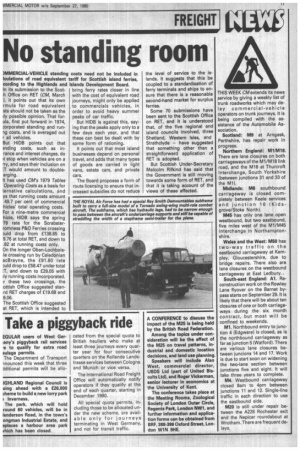No standing room
Page 19

If you've noticed an error in this article please click here to report it so we can fix it.
)MMERCIAL-VEHICLE standing costs need not be included in lculations of road equivalent tariff for Scottish island ferries, cording to the Highlands and Islands Development Board. In its submission to the Scoth Office on RET (CM, March '), it points out that its own rmula for road equivalent sts should not be taken as the ily possible opinion. That forula, first put forward in 1974, corporated standing and runng costs, and is averaged out r all vehicles.
But HIDB points out that 3nding costs, such as inrance and interest charges, do it stop when vehicles are on a rry, and says their inclusion on iT would amount to doublearging.
It has used CM's 1979 Tables Operating Costs as a basis for ternative calculations, and ys that running costs amount 49.7 per cent of commercial hides' total operating costs. For a nine-metre commercial hide, HIDB says the spring 79 rate for the Scrabsterromness P&O Ferries crossing )uld drop from £138.65 to 936 at total RET, and down to .82 at running costs only. On the longer Oban-LochboisIle crossing run by Caledonian acBrayne, the £91.80 rate Juld drop to £58.47 under total :T, and down to £29.05 with ily running costs incorporated. ir these two crossings, the :offish Office suggested stanird RET charges of £19.68 and 9.06.
The Scottish Office suggested at RET, which is intended to bring ferry rates closer in line with the cost of equivalent road journeys, might only be applied to commercials vehicles, in order to avoid heavy summer peaks of car traffic.
But HIDB is against this, saying that the peaks apply only to a few days each year, and that these can best be dealt with by some form of rationing.
It points out that most island businesses depend on personal travel, and adds that many types of goods are carried in light vans, estate cars, and private cars.
The Board proposes a form of route licensing to ensure that increased subsidies do not reduce the level of service to the islands. It suggests that this be coupled to a standardisation of ferry terminals and ships to ensure that there is a reasonable second-hand market for surplus ferries.
Some 70 submissions have been sent to the Scottish Office on RET, and it is understood that, of the five regional and island councils involved, three Shetland, Western Isles, and Strathclyde — have suggested that something other than a straightforward application of RET is adopted.
But Scottish Under-Secretary Malcolm Rifkind has said that the Government is still moving towards some form of RET, and that it is taking account of the views of these affected.




























































































































